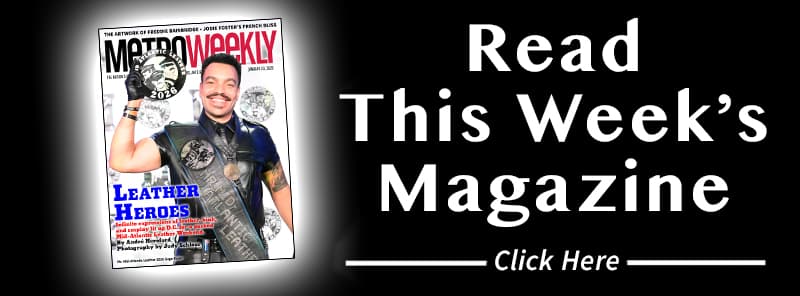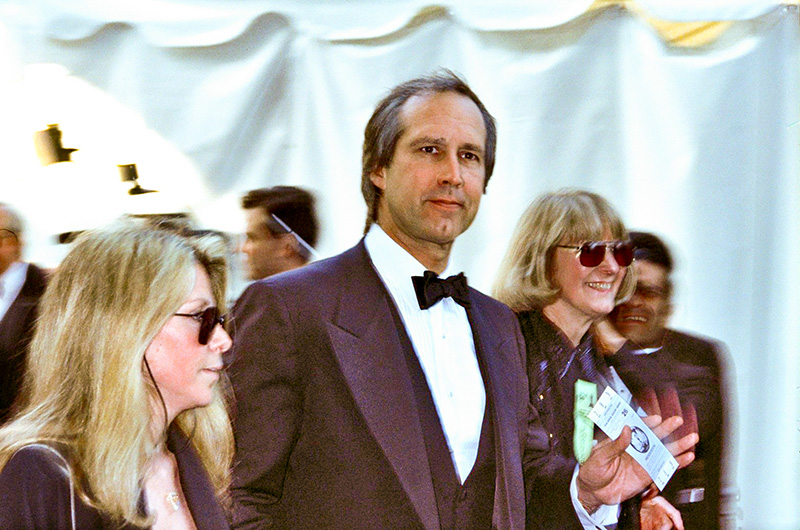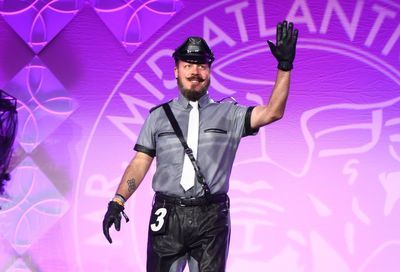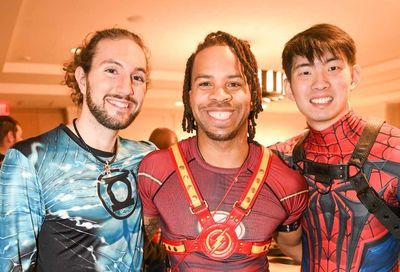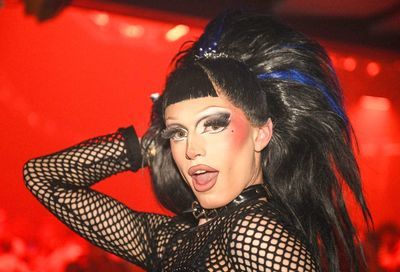Living Out Loud
Eric Millegan makes no bones about being a gay actor -- but don't be surprised to find he's much more than that
On the surface, an openly gay actor, one who majored in musical theater in college, may not run against the grain. But Eric Millegan is not one to be summed up and dismissed. The baby-faced 32-year-old — New Jersey native by birth, Oregonian by rearing — is full of surprises.
First, who would imagine that Millegan’s teen-looking profile is right at home in Las Vegas casinos, where he’s fond of poker tournaments — despite the frequent demands to prove his age? And how many actors are passionate enough about basketball to blog for the NBA?
Add to this his out of the ordinary career that has moved from incredible East Coast stage success in shows such as Harold and Maude: The Musical, Waiting for the Glaciers to Melt and Constellations, to a Los Angeles-based role on FOX Television’s Bones as Dr. Zack Addy.
 Millegan |
Though Millegan is maintaining a pace that’s allowed him no time off for the past two years, he’s adding some support for the community into the mix. When the Gay & Lesbian Victory Fund holds its seventh annual champagne brunch on Sunday, April 22, Millegan will serve as emcee. The D.C.-based Victory Fund works to get qualified, openly GLBT candidates elected to office.
Millegan also managed to find a bit of time last week to talk to Metro Weekly from his home in Beverly Hills about the Victory Fund’s work, his pal Rep. Barney Frank (D-Mass.), his peculiar fixation on Nathan Lane, and a variety of other interests that make Millegan a multi-faceted, multi-talented dynamo.
METRO WEEKLY: Are you happy to be living back on the West Coast?
ERIC MILLEGAN: In general, I’m closer to my family and that’s been nice. And then the whole thing — I have more space in my apartment and more space around — you’re not crowded by people and buildings and having a car and all that. But I love New York. I thought I was going to live the rest of my life in New York, so this is no disrespect to New York City. But it was nice to be someplace new and have my mind open up to a different way of thinking, driving, parking. I never had to do that in New York.
MW: Why your involvement with the Gay & Lesbian Victory Fund?
MILLEGAN: One of the great things about the Victory Fund that I’m learning is it’s not even about the politics, Republican or Democrat. They just want to increase the number of out officials so straight politicians can see that there are politicians who are gay. Then maybe when they are dealing with legislation that might be anti-gay, they’ll think, ”Wait, this person I worked with is gay. So when I’m talking about gays I’m talking about someone I work with as well.”
MW: Is that important in the same sense as you being out in your profession?
MILLEGAN: The thing that’s similar between me being out in Hollywood and people being out in politics is about how secrets can be more damaging than the truth. If I wasn’t out, everybody would be talking about how I am gay. I’d have to deal with all the stuff being said on the Internet about how I had a relationship with so-and-so. But when you’re open and honest about who you are, then it short-circuits people who would use the secret against you. I think it’s the same thing in politics. People who are out just don’t have to deal with people trying to expose that they are gay to hurt them.
But the Victory Fund is just about showing there are gay people in the real world so let’s have them in Congress and in other leadership positions. I definitely feel that when I go and vote that I have to vote as a gay person. Part of me might ask, ”Should a group specifically be trying to raise money for gay candidates just because they’re gay?” But it’s important because it increases awareness and it gives us representation now in the political field.
MW: We’ve had an actor as president, actors as governors, Congress people, etc. Would you ever consider running for office?
MILLEGAN: Gosh, I don’t know. When I was younger I used to say, ”Oh, I’ll run for president after I’m an actor.” But I don’t have that ambition anymore.
But I do think that it’s important to have openly gay voices in politics. I think that’s also true with sports — the whole basketball thing with Tim Hardaway saying he hates gays. It would be great if someone he likes — because he says he would never want a gay person in the locker room with him — who has been in the locker room with him, who played basketball with him, who he has liked, says, ”I’m gay.” Then he’d have to say it’s one thing to hate gays, but it’s another thing to hate this specific person.
The Victory Fund is all about helping people get to know gays and lesbians as their friends, their neighbors, co-workers, representatives — like the NBA thing — getting people out there so people can see that gay people aren’t just a concept, they’re real people. And I’m actually friends with Barney Frank, whom I know they’ve supported.
MW: How did you become friends with him?
MILLEGAN: I was always impressed with him for being a politician out there who is openly gay. And after Sept. 11, I wrote him a letter, even though he wasn’t my congressman. [President] Bush had just given us that tax cut, but I was like, ”We need that money to take care of our country now.” [Frank] and I ended up meeting in D.C. and we hung out. He came to New York a couple of times and I took him out to dinner with my friends. He’s a good guy.
MW: You also write a sports column, right?
MILLEGAN: I became a big fan of the NBA around 1989 — a big Portland Trail Blazers fan. Around 2000, I was running a little Web site on America Online called ”Eric Millegan’s Speeding Through the NBA.” That got recognized as one of the top sports sites on AOL and then somebody from the Oregonian newspaper asked me to write a column for Oregonlive.com. I wrote columns for them for five years. Then [the NBA] asked me to write a blog for them and the opportunity to write about the whole NBA as opposed to just the Portland Trailblazers was appealing to me. So I stopped writing for Oregonlive.com because I wasn’t going to write both — and I wasn’t getting paid. It’s all out of love that I write basketball blogs.
MW: Do you play basketball?
MILLEGAN: In college, I played on an intramural team for a couple of years. In New York, I played in a basketball league in Chelsea. More recently, I played for the NBA Entertainment League, which is here in L.A. It’s a league for people in the business — actors, celebrities, agents, writers and directors — and we just finished the season. Then we lost in the first round of the playoffs. Oh, my God, how horrible! It was awful!
MW: As a gay fan of basketball, how closely did you follow John Amaechi’s coming out, followed by Tim Hardaway’s homophobic comments?
 Millegan (right) in a scene from ‘Bones’ |
MILLEGAN: Somehow, I knew John Amaechi was gay before that whole thing happened. I thought, ”Didn’t they already know that?” I can’t remember why. I can’t remember how, but I did know before he came out in that book.
The Hardaway thing was very scary. Remember the scene in Borat, when Borat is at the rodeo and says, ”In my country we string up homosexuals and hang ’em,” and the cowboy at the rodeo says, ”Yeah, that’s what we’re trying for in this country.” I’m around people who, as far as I know, are not homophobic like that. So to hear someone say that, it’s like, can you believe there are people in our country who really think that way? I had no idea. I guess I’m sheltered.
With Tim Hardaway, when he said that, I was like, ”What? Really?” I guess I’m in a circle where people are understanding and tolerant, so that was scary.
In a way, I like that he was honest because I thought there are people who think that way and then some people came out and responded. I think Mark Cuban came forward and said, ”If any NBA player came out there’d be a lot of money to be made. He’d be embraced by the gay community and he’d get endorsement deals.” I can’t remember why he said that, but it was a very supportive thing for Mark even to say. He was basically saying, ”If you’re gay, come out.” I wish they would. There’s got to be a good amount of gay people in the NBA and it would be great if they came out and finally ended the barrier. That’s the next big barrier for coming out, I think.
We have actors like myself and others who are on television who are openly gay, and we have politicians who are openly gay, but we don’t have the professional athletes. They come out after they’ve retired, but we don’t have baseball, football or basketball players who come out while they’re in the leagues.
MW: You’ve written that you’ve more or less always been out. When did you come to terms with being gay?
MILLEGAN: When I was in first grade, I had a major crush on my [male] teacher. When I was in summer camp, there were some guys who I really liked. I didn’t know what it was, but I wanted to be very close to them. When I got to college at 17, it was only like four or five days after classes started that I was suddenly in the throes of a relationship with a guy. He’d gotten up in class and said, ”Anybody want to go to a movie?” I said, ”I do,” and we went out to a movie. We had a close connection, and I ended up staying the night at his place — he slept on the couch. But before you knew it, I realized I was gay. Then I was in denial. I tried very hard not to be. I would have crushes on guys, but I was unwilling to say that I was gay. You can’t help your feelings. You can try to suppress them. You can be in denial all you want, but you can’t change the fact that you have feelings for people.
MW: Had anyone ever bullied you without you being aware that you were gay? Anyone ever call you ”faggot” when you were young?
MILLEGAN: No. But I remember telling a friend of mine that I was attracted to this guy, but I can’t imagine ever being able to say openly that I was gay. Then I went to do summer stock and I fell really in love with a guy. It was unrequited love. He turned me down and my feelings were really hurt. I suddenly realized, ”You are gay. You’ve been in denial, but you’re seriously attracted to this guy and he hurt your feelings.” Once my feelings were hurt, I realized that my feelings were real.
MW: Sounds cathartic.
MILLEGAN: Once my heart was broken, I realized the truth of my heart and then it was all clear. I was like, ”I’m gay.” I was totally fine by that. And I went back to college, it was my junior year in college that fall and I was fine. I went to the local gay bar, of which I’d always said, ”Oh, I’ll never go there.” I remember there was an openly gay guy in the musical theater program, who I was aware was openly gay, and I thought, ”Oh, my God, I’ll never be like that.” But suddenly I was. Suddenly I was just totally fine.
MW: I may be stereotyping, but there must’ve been quite a few gay fellows in the musical theater department.
MILLEGAN: I just wasn’t aware of it, but I was after I came out. One of the coolest times of my life was that fall when I came out. I was just totally okay with who I was. I was fine and excited and so open to the men around me. I was young and suddenly aware that people that I was attracted to were attracted to me. And I fell in love. I went out to dinner with the costume designer at the University of Michigan and I fell in love with him. That was an exciting relationship, like the first real boyfriend, the first healthy gay relationship I had. That was a good relationship, a really good time.
It had a horrible end. He broke up with me on Valentine’s Day. But we’ve stayed friends. We’re good friends now. I’m not sure how much to tell you….
MW: Why, is there something juicy? I remind you we are still recording.
MILLEGAN: I’ve had a crush on Nathan Lane. Back then, without going into all the details, I ended up talking on the phone with him, but he didn’t call me back. Again, heartbroken. I’d go on and on to my boyfriend about how upset I was, so that’s why he broke up with me, rightfully so. I had this boyfriend, but I had a crush on someone else, too. Can’t you be attracted to two different people?
MW: That depends on whom you ask.
MILLEGAN: I don’t know how you can be attracted to someone and then turn off any attraction you might have for someone else, no matter how in love you are.
MW: How long have you held the Nathan Lane flame?
MILLEGAN: Sometimes I think it’s over, but it doesn’t go away. I’ll think it’s over, and then I’ll have a dream about him. I guess I’ll always have an attraction to him. I don’t know why.
MW: Your love of the stage predates your love of Nathan Lane. How old were you when you started acting?
MILLEGAN: My earliest performing experience was when my oldest sister, Lisa, was in the choir in elementary school. Because she and I walked home together, I would go to the rehearsals with her. I got into all the songs and I was really excited — I think more than anybody else in the choir. We’d sing ”We Go Together” from Grease. But I couldn’t be in the concert because I wasn’t old enough. I was 6. My mom was very mad about that, and they finally said, ”Okay, he can sing a solo if he wants to.” I sang ”You’re Never Fully Dressed Without a Smile” from Annie, and wore a top hat and a cane. That was very exciting for me. My dad took a look at my interest and tried to help me do more of what I clearly enjoyed doing.
I was very young when I asked my mom, ”Is it really true you can be whatever you want to be?” And she said, ”Yes.” And I said, ”Well, I want to be an actor.” That was clear right from then.
 Millegan (left) in a scene from ‘Bones’ |
MW: As an actor to this day, you’ve written about how being out hasn’t been a handicap in your career.
MILLEGAN: Not that I know of. I don’t know how my career would be if I wasn’t out, but it seems to be going okay. A TV show is about the best job an actor can get — it’s a regular gig. On a hit show like Bones, you’re getting a regular salary.
MW: Do you hope that your being openly gay and employed in the industry will help other actors come out?
MILLEGAN: I hope so. Some actors think that the only way to get work is by pretending to be straight, but there are a lot of straight people who aren’t working, so I think people can let go of that. You have T.R. Knight and Neil Patrick Harris who are openly gay and play very, very straight roles.
MW: Their sexual orientation has gotten a lot of attention.
MILLEGAN: I hope I can be more inspiring in a way, because I was out before I got the job. I think that’s more of a rare occurrence. I was completely out. All you had to do was Google me to find out I was gay. If I was aware of someone who was gay and got a national television show, that would have really inspired me. There was Will & Grace, and people like Ellen DeGeneres and Rosie O’Donnell coming out, but they came out after they had succeeded.
MW: Would you ever advise a fellow actor to stay in the closet?
MILLEGAN: I would never do that. I would encourage them to be openly gay. At least, don’t lie. If you just want to keep your life private and be quiet about it, I think that’s better than full-out lying. I read an interview with an actor in New York who said, ”Oh, I just haven’t met the right girl yet.” Not only is he gay, but we all know his boyfriend. He’s not very closeted around town, so when he said that, it’s like, ”Oh, come on!” I get letters and e-mails from young people who say it means a lot that I’m gay.
MW: What about being a gay actor in Hollywood versus being a gay stage actor in New York? Is there a difference?
MILLEGAN: It seems like everybody I ever meet [in Los Angeles] whom I think might be gay turns out to be straight and married. I suppose if I hung out at all the bars in West Hollywood I’d be hanging out with more gay people. I feel more at home as a gay person in New York in musical theater. I feel like there are more gays in musical theater than in TV.
MW: Do you miss stage work, the song and dance?
MILLEGAN: I miss it, but I’m glad to be doing what I’m doing now. If the right theater project shows up down the road, I’ll consider it. I did just do The Pirates of Penzance over Christmas break in Oregon. That was a big challenge and it’s one of the other reasons I need to make sure I take time off right now — I didn’t take time off during my Christmas break. I shot Bones all fall and then I did Pirates and I haven’t had any time off. I did a movie during the last hiatus so I really haven’t had any time off from work for about two years now.
MW: What about the writing? Do you think you’ll do more?
MILLEGAN: I’d like to do an NBA column or a sports writing job that I got paid for. That would be cool. And I have a dream of a sports talk show. Again, my job is very demanding, so I question whether I’d have the energy to do both. But in theory I have this idea for a basketball talk show that I think would be really fun and very exciting, but I don’t know if I’m capable of doing that and the show at the same time. Maybe it’s something I’d do when the show is over. We’ll see. I have dreams. We’ll see how many I can realize.
Eric Millegan will emcee The Gay & Lesbian Victory Fund’s 7th Annual Champagne Brunch on Sunday, April 22, at the Mayflower Hotel, 1127 Connecticut Ave. NW. Tickets are $125. For more information, visit www.victoryfund.org/brunch or call 202-742-7313.
Support Metro Weekly’s Journalism
These are challenging times for news organizations. And yet it’s crucial we stay active and provide vital resources and information to both our local readers and the world. So won’t you please take a moment and consider supporting Metro Weekly with a membership? For as little as $5 a month, you can help ensure Metro Weekly magazine and MetroWeekly.com remain free, viable resources as we provide the best, most diverse, culturally-resonant LGBTQ coverage in both the D.C. region and around the world. Memberships come with exclusive perks and discounts, your own personal digital delivery of each week’s magazine (and an archive), access to our Member's Lounge when it launches this fall, and exclusive members-only items like Metro Weekly Membership Mugs and Tote Bags! Check out all our membership levels here and please join us today!







